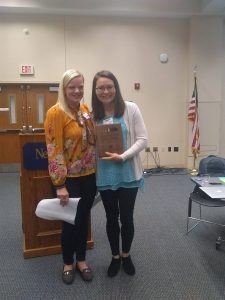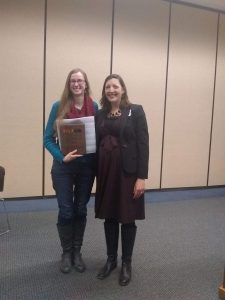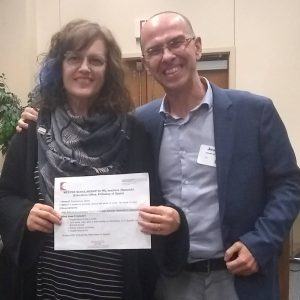2020 MALT Colloquium Call for Proposals
DEADLINE: All session proposals must be received by January 8, 2020.
14th Annual Colloquium on Language Teaching
Saturday February 8, 2020
9:00 AM-3:00 PM, Mammel Hall (UNO Scott Campus)
The MALT Annual Colloquium on Language Teaching seeks to create a community of local area language teachers & learners, promote interdisciplinary collaboration, and encourage research in the field of Language Education. The event is free and open to the public.
Event Schedule:
9:00-9:50: Meet & Greet and Poster Session
10:00-11:00: Keynote address by Dr. Catherine Compton-Lilly
11:15- 12:15: Morning Presentations
12:20-12:50: Light Refreshments and Social
1:00- 2:00: Afternoon Presentations
2:15 3:00: Round-Table & Open Discussion: “Social Equity in Language Learning”, with the participation of experienced teachers and stakeholders from our community
Who Can Submit Proposals:
Proposals from teachers at all levels of instruction and of all world languages and ESL/EFL are welcome; however, first priority will be given to proposals that are accessible to teachers of all languages and levels. We strongly encourage graduate students to participate by submitting a proposal.
Types of Proposals:
We invite proposals for either Presentations (Track A & Track B) or Poster Sessions. Find below a description of Presentations and Poster Sessions.
Proposals will address the following areas:
- Language teaching/learning strategies
- Language learning styles
- Pedagogical innovations in language teaching, assessment & evaluation
- Language & culture
- Teaching literature and/or civilization within the language class
- Language & technology
- Second/foreign language acquisition: connecting theory to practice,
- Literacy, applied linguistics, and sociolinguistics
Description of Presentations and Poster Sessions
- Presentations Track A: Pedagogical and interactive presentations. The specific goal of this track is to introduce pedagogical innovations and open the floor to conversations among fellow teachers.
- Presentations Track B: Research-oriented presentations to introduce or discuss new research and its application to the classroom. The specific goal of this track is to familiarize the audience with current research and theories, and their potential classroom use.
- Poster Sessions: digital or physical posters (48″ x 36″) accepted. The specific goal of this track is to share classroom-based research projects with a larger audience.
No lunch will be provided. Light refreshments only.
Submission Process:
DEADLINE: All proposals must be received by January 8, 2020.
Proposal submissions should indicate the selected track, and include a title, a 250-300 word abstract, and a 50-word summary for the conference program.
All abstracts will be submitted for blind review. Thus, the following submission guidelines should be closely followed:
• All submissions should include selected track, abstract, title, and 50-word summary.
• DO NOT include any identifying information in the abstract itself.
• Include your contact information (name, email, phone, school affiliation) in the body of your email only.
• Proposals must be submitted via email to melaniebloom@unomaha.edu.
Upon submission, you will receive an email confirmation indicating that your proposal was received.
University of Nebraska Omaha MALT Colloquium 2020
14th Annual MALT COLLOQUIUM
The University of Nebraska Omaha’s Master of Arts in Language Teaching Program announces its annual Colloquium.
Keynote Speaker:
Dr. Catherine Compton-Lilly
John C. Hungerpiller Professor
at the University of South Carolina
“Transnational Awareness and
Cosmopolitanism: Funds of Knowledge Brought by Children in Immigrant Families”
Dr. Compton-Lilly has devoted long-term research to following and describing her experiences with students of immigrant families in the Midwest. Her work studies ways to structure schools to leverage students’ experiences and to build stronger networks of support for students and their families.
WHEN:
Saturday,
February 8, 2020
WHERE:
Mammel Hall
Scott Campus
MEET & GREET:
9:00am
Mammel Hall, Lobby
KEYNOTE ADDRESS:
10:00am
Mammel Hall, Rm 113
UNO SPONSORS:
Foreign Languages & Literature, English, ILUNO, OLLAS, Graduate Studies
FREE EVENT:
Open to the public
Planning Ahead: Preparing for 2020
Good planning starts early. Please consider being involved in any of the following events.
World Language Week, April 5-11, 2020
Annual event celebrates world language learning in Nebraska. Distinguished Scholar awards submissions will begin in January and are open to all students at any level of world language learning who are earning high school credit.
Consider planning events in response to World Language Week and share them with NDEWL. Museums, community centers, and the business community are all potential partners to collaborate on a meaningful world language experience.
For more information about World Language Week, please visit NDE World Language at www.education.ne.gov/worldlanguage.
University of Omaha MALT Colloquium, February 8, 2020
The Masters of Art Language Teaching Program is accepting proposals for its annual colloquium.
Central States Conference on the Teaching of Foreign Languages, March 12-14, 2020
Central States is the regional division of the American Council on the Teaching of Foreign Languages. With awards, grants, and scholarships available, seriously consider making the journey to Minneapolis this year. Attendees are also welcome to join the Central States Cornhusker Contingent, a group of like-minded Nebraskans who share their travel experience.
French February: Placements Needed for French Exchange
February in Nebraska—it’s evidently for the French! Language & Friendship, Inc., a Minnesota based non-profit agency, is again bringing French students to Nebraska in February. Bellevue East French Teacher Nora Boyd has hosted for three years. She shares, “It has been a great experience. I know that February in Nebraska doesn’t seem like the best time to come visit, but the students were pretty delighted with all the snow. In fact, February seems to be a little easier for some host families because there aren’t a ton of activities going on then.
The organization is currently seeking placements for the visitors. Students are aged 14-16 years old and will stay from February 8 – February 28, 2020. The group is from Lycée Marie Pilain Carpentras, a school near Lyon. The students are part of a special program that concentrates on English. Language and cultural immersion is the goal.
While in the United States, students will attend school with their hosts. The Nebraska school would have to provide permission for the student to visit. There are no group activities during the stay. Host families provide the visiting student with his/her own bed, but it can be in a bedroom that is shared with a host sibling of the same gender and similar age. Host families also provide meals. Students come with other spending money and an open mind.
Nora Boyd comments, “It’s pretty low stress on the teachers, outside of doing the home visit and calling references for the family placement. During the actual stay, the students have all generally been pretty self-sufficient and enjoyed hanging out with their host families and attending school.”
If you are interested in participating as a site host or a family placement, visit the Language & Friendship website or contact Nora Boyd at nora.boyd@bpsne.net.
UNO Announces MALT Colloquium 2020
(Submitted by Dr. Claudia Garcia)
The Department of Foreign Languages & Literatures and the MALT Program at UNO announce the 14th MALT Annual Colloquium on Language Teaching, to take place Saturday February 8, 2020 from 9:00-3:00 PM at Mammel Hall (UNO Scott campus). The event is free and open to the public.
This year’s Colloquium includes a Keynote Address by Dr. Catherine Compton-Lilly (University of South Carolina) on “Transnational Awareness and Cosmopolitanism: Funds of Knowledge Brought by Children in Immigrant Families” (10:00-11:00); Morning and Afternoon Presentations (11:15-12:15; 1:00-2:00); and a Round Table & Open Discussion on “Social Equity in Language Learning” (2:15-3:00). A Meet & Greet and Poster Session will start the event at 9:00.
Find more information on the colloquium, visit 2020 Malt colloquium poster for website.If you have questions, you can contact: Marie Lee at mglee@unomaha.edu, Dr. Claudia Garcia at csgarcia@unomaha.edu, or Dr. Melanie Bloom at melaniebloom@unomaha.edu.
Field Trip: Art in French
Standard 3.1: Students apply the language of study to discuss other content areas of study.
Omaha North High School French Teacher Margarita Fernandez de Blas shares an art project based on painter Robert Delaunay who assisted with the construction of the Eiffel Tower. Delaunay reproduced many paintings of the Eiffel Tower using techniques based Impressionism, Cubism, Fauvism, and Pointillism. The artist and his wife also created a style called “orphism” which uses the circle as a base of painting. In Fernandez de Blas’ classroom, students create a painting of the Eiffel Tower, cut it into five or six pieces, and then rebuild it in a free form. Then, using circles of various sizes, they create the background. Student artwork is displayed with a mural of the Eiffel Tower and artwork by the painter.
Standard 3.1 states that students will apply the language to discuss other content areas of study. According to the indicators, novice low learners can label colors and shapes. Intermediate low students begin to describe the painter and his influences. Skillfully using vocabulary specific to the subject, such as “orphism”, is exactly the use of language to reinforce and expand knowledge in all content areas.
Standards In Focus Nebraska’s Cognition Strand
Standard 5.1 Students self-assess growth in language learning, practice, and understanding.
Standard 5.2 Students set language learning goals and organize priorities.
Replicating success is easier when the pathway to success is clearly understood. Nebraska World Language Standards 5.1 and 5.2 focus on the cognition of second language learning. By learning the cognition and metacognition of language study, students will be better able to engage in and take responsibility for their own learning. O’Malley (1985) clarifies the difference between cognition and metacognition. Cognition refers to the strategies used for specific learning tasks. Metacognition references the executive functions of planning for learning, evaluating progress, correcting mistakes, and forming a new plan responsive to needs.
Directly addressing cognitive and metacognitive strategies can increase student effectiveness in all three modes of communication. Henner Stanchina (1987) demonstrated that effective listeners improve interpretation by maintaining a constant inner dialogue to elaborate and transform what they hear. These listeners also recognize failure in comprehension and activate appropriate knowledge to repair the failure. Anderson (2002) suggests that students “may be taught that an effective writing strategy involves thinking about their audience and their purpose in writing.” By practicing cognitive strategies used in the presentational and interpretive mode, students become better prepared to use them during the dynamic interpersonal mode.
Practical examples of cognitive and metacognitive teaching are easy to find. Products like LinguaFolio, LinguaFolio Nebraska, and LinguaFolio Junior, have established a foundation of self-assessment, goal setting, and prioritization. However, Nebraska’s challenge is to encourage the function of these activities in the language of study. By creating these models in the target language, at an appropriate level and with scaffolding, we provide greater relevance and context to the language. Consider the following. Routine classroom management tasks, when accomplished in the target language, become acquired language. Students understand the intent of commands without knowing the conjugation structure. At novice levels, cognition and metacognition can be approached through isolated words or short phrases such as “I understand a little, a lot, not at all” or “I think, I read, I write, I speak”.
The “Nebraska C”, cognition, is merely a defined approach to best practice and research. Taking an active role in planning for language study, establishing processes and connections, and evaluating progress creates a partnership between the student and teacher that promotes more successful language learning.
References
Anderson, N. J., & Eric Clearinghouse on Languages and Linguistics, Washington, Dc. (2002). The Role of Metacognition in Second Language Teaching and Learning. Eric Digest. ERIC Clearinghouse on Languages and Linguistics.
Henner Stanchina, Carolyn. 1987. “Autonomy as Metacognitive Awareness: Suggestions for Training Self-Monitoring of Listening Comprehension.” Méanges Pédagogiques, 69-84.
O’Malley, J. M., Chamot, A. U., Stewner-Manzanares, G., Kupper, L.J. & Russo, R.P. (1985). Learning strategies used by beginning and intermediate ESL students. Language Learning, 35(1): 21-46.
NILA Special Report 2020 NILA Board
The following positions were confirmed or elected at the NILA Annual Conference. For more information about each individual, visit the NILA website.
Past President:
Alicia Dallman Shoemaker (Elkhorn)
President:
Dr. Janet Eckerson (Lincoln)
President Elect:
Katy Cattlett (Omaha)
Vice President:
Liliana Velasco (Columbus)
Secretary:
Dr. Jonathan Dettman (UNK)
Treasurer:
Dr. Jami Holbein Swanson (Lincoln)
Exhibit and Vendor Chair:
Cara Heminger (Lincoln)
Communications Chair:
Will West (Lincoln)
President, NATG:
Pat Branson (UNO)
President, NATF:
Cara Heminger (Lincoln)
President, NATSP:
Angie Wagoner (Crete)
Notable Nebraskans Wendy Brennan
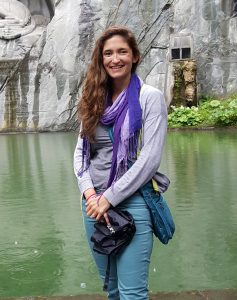 Wendy Brennan
Wendy Brennan
German Teacher, Millard North High School
Past President, American Association of Teachers of German (Nebraska)
wmbrennan@mpsomaha.org
What was your motivation to become a language teacher?
I always wanted to be a teacher, and I loved learning German, so it seemed like a logical fit for me. Since becoming a German teacher, I’ve learned so much from my colleagues and peers through professional organizations. The relationships I’ve built through NILA and AATG are so motivating and inspiring; I will never be done learning!
Describe your classroom approach in five words or less.
“There’s method to my madness!”
How do you feel Nebraska is raising the standards for world language education?
As someone who attends regional and national conferences, and as someone who has been closely involved with the NILA conference in several different roles over the years, I can say with some authority that the sessions we offer through NILA are consistently top-notch. Nebraska’s best world language education resources are its teachers, and the networks we build through face-to-face collaboration at workshops and conferences enable us bring the very best practice to our classrooms.
What would you recommend to educators to build their pedagogy and practice?
Our profession is tough. Teachers need each other for support and fresh ideas. Go to the conference, attend the workshop, email the presenter who inspired you – build those networks! If you seek out both formal and informal learning opportunities and try to apply what you learn to your instruction, you will grow as an educator, and your students will benefit from your lifelong-learner mentality.
NILA Special Report 2019 NILA Awardees Honored
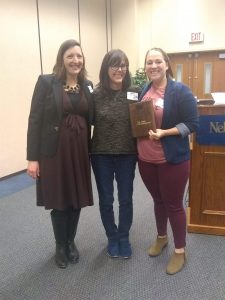
Alicia Dallman Shoemaker (left) and Angie Wagoner (right) present the award to Jami Holbein Swanson (center).
NATF Teacher of the Year Sasha Van Zandt
Nebraska Association of Teachers of French (NATF) President Cara Heminger (Lincoln North Star) awarded Sasha Van Zandt of Lincoln Southwest High School the NATF Teacher of the Year. Van Zandt has been actively involved in French activities at Southwest and around the state. Last year Van Zandt traveled to France with colleagues Will West and Kristen Tangen and 22 students. Van Zandt has also presented at NILA conferences.
NATSP Teacher of the Year Dr. Jami Holbein Swanson
Nebraska Association of Teachers of Spanish and Portuguese (NATSP) President Angie Wagoner awarded North Star High School Spanish teacher Dr. Jami Holbein Swanson the NATSP Teacher of the Year. Holbein Swanson has worked with Lincoln Public Schools for 23 years. Holbein Swanson, a long-term advocate for world language learning, is now working directly with heritage and native speakers of Spanish to promote first language literacy.
NILA New Teacher of the Year Kelleen Browning
NILA President Alicia Dallman Shoemaker awarded Lincoln Southeast High School German teacher Kelleen Browning the NILA New Teacher of the Year. Browning completed a Fulbright English Teaching Assistantship in Germany during 2014-2015. She also studied in Germany for six months with UNL’s Deutsch in Deutschland program. Browning is the incoming President of the Nebraska Association of Teachers of German and hosted the 2019 Wunderbar Together German Students’ Convention.
NILA Special Report Theresa Jensen Wins Study Abroad
Millard North Spanish Teacher Theresa Jensen won a prize drawing award of a lifetime. Jesus Jurado Mendoza, Education Advisor for the Spanish Embassy Ministry of Education, presented Jensen with the MESTER Scholarship. The scholarship will allow Jensen two weeks of study, lodging included, in Salamanca, Spain. The Spanish Embassy Ministry of Education supports Nebraska teachers of Spanish with many programs including materials, scholarships, and language assistants. Find out more at: https://cehs.unl.edu/tlte/spanish-studies-institute/
NILA Special Report NILA Conference Raises the Bar
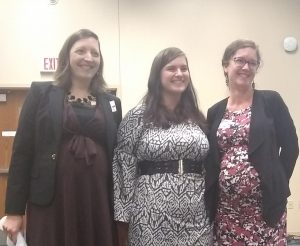
Alicia Dallman Shoemaker (L) and Janet Eckerson (R) present Ralston Spanish Teacher Jamie Honke (center) with the Best of Nebraska Session 2018. Honke will present at Central States Conference in Minneapolis March 12-14, 2020.
The 2019 Nebraska International Languages Association Annual Conference convened Friday and Saturday October 11 and 12 at the University of Nebraska Kearney. Over 150 participants filled the Nebraskan Student Union during the two-day event.
Friday began with a workshop presentation, “Raising the Bar: Nebraska’s World Language Stanards”. Stephanie Call, Nebraska Department of Education World Language Specialist led the participants through a foundational discussion regarding the essential ingredients of language learning before presenting the 2019 standards. Discussion then turned to how the standards are reflected in current practice.
Saturday was a full day of sessions, vendors, and networking. Twenty-five presentations included student involvement, promoting proficiency, technology integration, and advocating for world languages. Saturday’s keynote was presented by Stephanie Call who shared her understanding of the standards through her professional experience as a 7-12 Spanish educator. During lunch, the NILA Board of Directors, the American Association of Teachers of German (Nebraska), the American Association of Teachers of Spanish and Portuguese (Nebraska) and the American Association of Teachers of French recognized their teachers of the year.
The 2020 NILA Annual Conference will be at Omaha South High School in October 2020.
Cathy Demoude Nebraska World Language Teacher of the Year
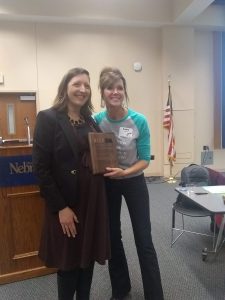
NILA Past President Alicia Dallman Shoemaker (left) presents the award to World Language Teacher of the Year Cathy Demoude (right).
The Nebraska International Language Association recognized Hershey Spanish Teacher Cathy Demoude as the 2019 World Language Teacher of the Year at the NILA Annual Conference at the University of Nebraska Kearney October 12. Demoude has taught in Hershey Public Schools for 29 years. Principal Jeff Steinbeck commented, “Her enthusiasm for the content and her love for speaking another language shows every day. She is one of the most positive people I have ever been around.” Mr. Steinbeck shared Demoude’s emphasis on language use, “Cathy’s classes are conversational. When you walk into her room, all students are speaking back and forth in conversation.” Demoude’s longevity in the district has provided stability for a strong program that is evidenced through results. Mr. Steinbeck shared that numerous students have returned to share college success, new hirings, and promotions due to language learned in her class.
National Network for Early Language Learning Invites You
(Submitted by Marissa Coulehan, NNELL Executive Secretary and FLES Spanish Teacher)
Welcome to the 2019-2020 school year! Check out what NNELL (National Network for Early Language Learning) has been up to at www.nnell.org. We also invite you to join our #EarlyLang chat on Twitter, which is held every second and fourth Wednesday, 8:00-9:00 p.m. EST.
You are invited to join NNELL. An individual membership is only $30! Your membership dollars help early language programs and teachers in so many ways:
• helping us produce our beautiful journal, Learning Languages
• helping us provide webinars – free for all members
• helping us to advocate for early language learning
Are you coming to ACTFL in Washington, D.C. this November 22-24, 2019? Join us at NNELL’s Networking Breakfast on November 23, 2019 with guest speaker Rebecca Aubrey, 2019 ACTFL Teacher of the Year. She will present “Working Together to Advocate for Early Language”.
**Note: You must register for the breakfast in advance as no tickets will be available at the time of the conference.**
Nebraska Association of Teachers of German Update
(Submitted by Pat Branson, Nebraska Association of Teachers of German)
Guten Tag! Grüß Gott!
Welcome to a new school year! The NATG board would love to challenge all German teachers to become a member of AATG/NATG this year. Remember—to be an NATG member, all you have to do is join AATG. We know some of you feel your PLC in your district is enough, but we encourage you to join us and participate in our activities this year! We’d love to see some new faces and have you share your great ideas with us!
Seeking Officers and Educator of the Year
Our nominating committee needs nominations for President-Elect and Secretary- Treasurer for the coming year. Terms start in January. President-elect transitions to president and then past-president. The term for secretary- treasurer is two years. Please contact Pat Branson (bransonp@hotmail.com) if interested in running or to nominate someone.
NATG German Educator of the Year nominations are being sought. Information is on our website (www.aatgnebraska.weebly.com ). Any NATG member is eligible. The award will be presented at NILA in Kearney on Saturday, October 12.
NATG Fall Workshop Features Guest From ZfA
The NATG fall workshop is in the planning stages, but it looks like the date will be Saturday, November 2 in Omaha. Our guest will be Leeni Martinkari, the new “Beraterin für Deutschunterricht” from the Zentralstelle für das Auslandsschulwesen (ZfA). We hope to have a good turn-out for this meeting! More info will be sent soon.



